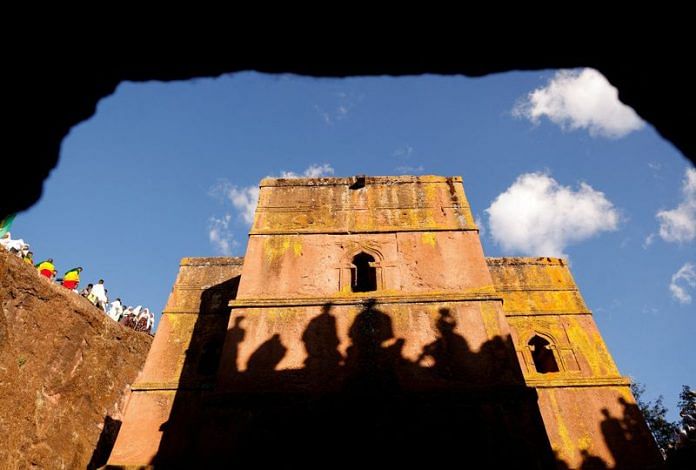By Giulia Paravicini and Dawit Endeshaw
NAIROBI/ADDIS ABABA (Reuters) -A fresh eruption of fighting in northern Ethiopia has raised concerns among residents about the safety of rock-hewn churches in the town of Lalibela dating back to the 12th and 13th centuries.
Fano militiamen fighting the Ethiopian army in the Amhara region over-ran Lalibela and Gondar for several days in August marking Ethiopia’s most serious security crisis since a two-year civil war in the neighbouring region of Tigray ended a year ago.
In a separate incident highlighting instability in the region, at least 30 people were killed in fighting between members of Ethiopia’s two largest ethnic groups, the Oromo and Amhara, in a town in the region’s Oromiya Special Zone, two residents said.
Fano fighters battled alongside the army during the war in Tigray, but relations between the two have soured, particularly after the federal government in April moved to integrate security forces operated by each region into the police and army.
On Sunday, Ethiopian soldiers fired heavy weapons 11 times from locations near the churches in Lalibela, a deacon said, sending damaging shockwaves through one of the subterranean places of worship.
“The vibrations are affecting the churches,” the deacon said, requesting anonymity for fears of reprisals.
Two residents confirmed the fresh wave of fighting. One said the army was stationed outside Lalibela and by the airport and started fighting on Saturday, firing heavy weapons towards a mountain overlooking the town.
The Ethiopian government, federal army and Amhara’s regional administration did not immediately respond to Reuters’ requests for comment.
Lidetu Ayalew, an Amhara politician based in the United States who grew up near Lalibela, said he feared the churches could be harmed.
“The churches risk being struck and destroyed due to careless firing of heavy weapons,” he said in a statement on Monday.
Designated a world heritage site by the United Nations in 1978, Lalibela’s 11 medieval cave churches were carved out of monolithic blocks to form a “New Jerusalem”, after Muslim conquests halted Christian pilgrimages to the Holy Land.
The UN in August said in the latest round of fighting in Amhara at least 183 people had been killed in the first month. With internet connections down across the region, Reuters has been unable to obtain a clear picture of the latest situation.
The latest Oromo and Amhara clashes between Friday and Sunday were over farmland in Mesno town in the Oromiya Special Zone, which has a majority Oromo population, two residents said.
“At least 30 people died during the clash while trying to defend their areas and their farmland,” said a priest in the town who did not wish to be identified, adding he had witnessed 12 of the dead being buried.
Ethiopia’s federal government and Amhara region’s government had no immediate comment to Reuters’ requests for comment.
(Reporting by Giulia Paravicini and Dawit Endeshaw; writing by Giulia Paravicini and George Obulutsa; editing by Alex Richardson and Jason Neely)
Disclaimer: This report is auto generated from the Reuters news service. ThePrint holds no responsibilty for its content.



